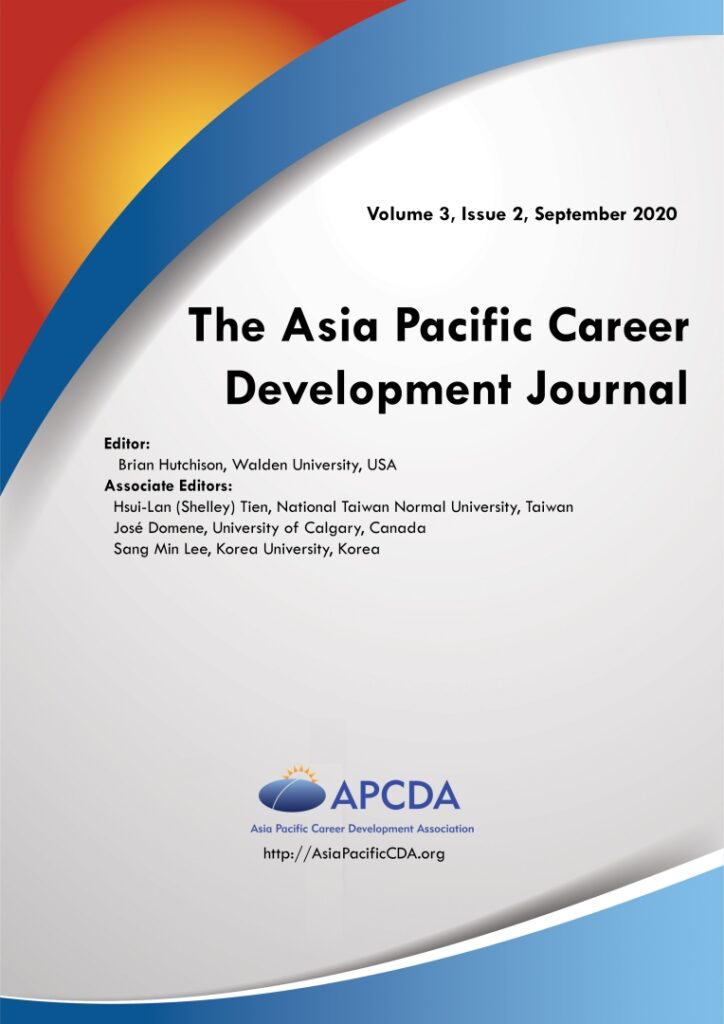The Asia Pacific Career Development Journal, Vol 3, No 2
Vol 3 No 2 (2020): September 2020 Issue
Published: 2020-09-12

Lead Article
Xuebing Su, Victor Wong, and Siu-Ming To
Abstract: NEET youth who are not in education, employment, or training are characterized by heterogeneity, dynamic experience, and different levels of vulnerability. This study examined the impact of amotivation and career adaptability on NEET youth’s career engagement and the moderating role of career adaptability in the relationship between amotivation and career engagement. A total of 2,677 valid pre-intervention questionnaires were collected from NEET youth participants aged 15-21 all over Hong Kong. The findings showed that amotivation had a negative association with career engagement, whereas career adaptability had a positive association with career engagement. We also identified an interaction effect between career adaptability and amotivation on career engagement among NEET youth. Our results revealed that a higher level of career adaptability and its four dimensions (i.e. concern, control, curiosity, and confidence) changed the direction of association between amotivation and career engagement of NEET youth. Implications for developing career support services to NEET youth were discussed
Empirical Articles
Catherine Hui, Mantak Yuen, and Queenie A. Y. Lee
Abstract: This paper explores the career and life planning experiences of mainland Chinese students who cross the border daily from China to study in Hong Kong’s senior secondary schools. The small-scale study explored factors that appear to influence cross-border students’ access to career and life planning activities that may affect their self-concept development and their identification of future life roles. A qualitative method of inquiry was used, involving focus group discussion followed by individual in-depth interviews. Findings indicated that major influences on career and life choices were (i) fulfilling parental expectations, (ii) pursuing students’ own interests, and (iii) making best use of personal strengths and aptitudes. Less significant factors included peer group influences. In terms of self-concept and lifelong development, cross-border students showed increasing tendency to see themselves as a future ‘workers’ and ‘citizens.’ They also perceive themselves to have greater flexibility than most mainland students to adapt to various working situations in the future. These findings provide new insights for schools seeking to implement high quality career and life planning programs for these students.
Amberyce Ang
Abstract: As countries face an aging workforce, it is pertinent to understand the experiences of older workers and how perceived age biases can affect them. Data was gathered from interviews conducted with 113 older adults between 55 to 72 years old. Framed in relevant theoretical perspectives, this study proposes a conceptual model to understand how older adults can be affected by negative age stereotypes at three main career points – late career, retirement, and search for bridge employment – and how perceived age biases interplay with other forms of biases and disadvantages. At the late career stage, older workers perceived that unfair HR practices were due to age stereotypes and a lack of academic qualifications. Upon retirement, retirees’ perception of age biases was influenced by income level. Retirees who sought bridge employment perceived that age biases had dampened their chances of securing a job.
Review Articles
Nika Ohashi
| Abstract: Japan and Finland, mostly homogeneous countries, have had an increasing number of immigrants in recent years. While Finland develops an integration system with career education and vocational training rapidly, based on 1999 legislation, Japan has just begun to realize the importance of organizing public support for immigrants. In this paper, Finland’s successful integration of a public career support program is examined in the context of the Japanese multicultural coexistence society. |
